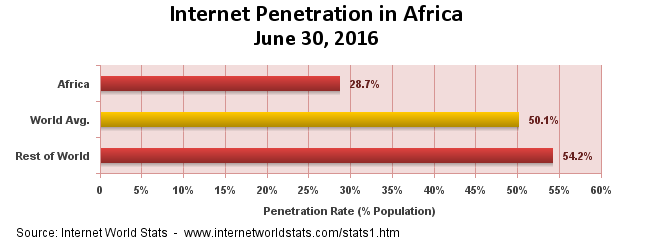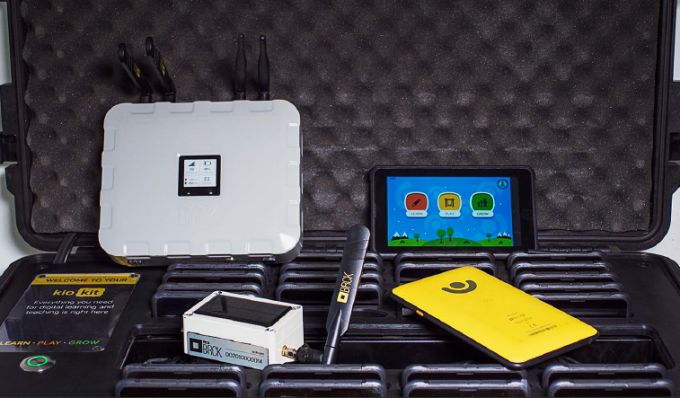Kenyan communications hardware company BRCK unveiled its SupaBRCK this week―a waterproof, solar-powered Wi-Fi box that operates as a 3G hotspot and off-grid server.
SupaBRCK is the sequel to BRCK’s eponymous debut product, launched in 2013 to tackle two common African IT challenges: reliable power and viable internet options.
BRCK version 1 delivered connectivity and USB charging for up to 20 devices. The new SupaBRCK―with its dual core processor and a 5 terabyte hard drive―can be plopped down in just about any environment to provide up to 100 internet connections, streaming video for 50 devices, and enough server capacity to run a Linux stack.
Accompanying BRCK’s hardware product is the startup’s new Moja service, which will provide ad supported free public internet access and a content delivery network (CDN) service through SupaBRCK devices.
“We are moving from just being a hardware company to becoming a platform company, as we connect SupaBRCK to Moja and start having a network that covers entire countries,” BRCK chief executive Erik Hersman told TechCrunch.

As a startup, BRCK’s central focus has been delivering internet to Africa’s masses. Despite progress on mobile phone ownership and ICT infrastructure over the last decade, the continent remains one of the world’s most digitally disconnected. Though some countries, such as Kenya and South Africa, have attained high usage, internet penetration for the continent lingers at less than a third of Africa’s estimated 1.2 billion people.
Improving those numbers, according to Hersman, is as much about cost as actual internet availability. “The demand on internet in Africa is largely driven by the 10 to 15 percent who can afford it. The real massive opportunity is trying to connect the 70 to 80 percent of the people can’t. That’s where the internet race really is,” Hersman said.
BRCK’s revenue strategy, according to Hersman, includes not just generating sales from hardware, but “figuring out a business model that allows internet to work for those who can’t pay for it, while still generating a profit.”
Achieving this is a work in progress, he explained. Hersman noted possibilities to connect BRCK’s CDN network to greater advertising partners. There are also opportunities for partnerships with blue chip tech firms moving into Africa. “Most of the big companies―Google, satellite companies―are all doing transmission, they are not doing distribution,” said Hersman. “That’s where BRCK has a real competitive advantage and it makes us good partners with those companies. They provide the transmission end and we provide the transition out―that last meter between your phone and the Wi-Fi.”
Improving internet availability and affordability in Africa had become central to continent’s burgeoning IT ecosystem. Pan-African e-commerce startups like Jumia need it to create a customer base. For global tech companies such as Facebook, Google, and Netflix―all of which increased their presence in Africa in 2016―viable net access underpins growth possibilities on the continent.
BRCK, which is an outgrowth of Kenya’s iHub and Ushahidi crowdsourcing company, has been developing a suite of products to meet public and private internet needs.

Founded by Hersman with a leadership team that includes tech leader Juliana Rotich, the Kenyan startup is backed by $4.2 million from investors including Steve Case and TED. BRCK moved into education in 2016 with its KIO classroom tablets. It will also offer a new PicoBRCK―an ultra-rugged device designed for Internet of Things applications―later this year. Retail sales for the $700 SupaBRCK begin this summer. The min-server and Moja network is being deployed in Kenya and Rwanda this month.
BRCK moved into education in 2016 with its KIO classroom tablets. It will also offer a new PicoBRCK―an ultra-rugged device designed for Internet of Things applications―later this year. Retail sales for the $700 SupaBRCK begin this summer. The mini-server and Moja network is being deployed in Kenya and Rwanda this month.
Hersman sees global application for the company’s products “anywhere there are internet connectivity challenges.”
He notes the first BRCK shipped to over 50 countries and views potential in markets where people have low disposable income. “The adjustable market for internet in Africa alone is 800 million people. The adjustable market throughout all frontier markets is about 3 billion. Most of those people live on less than $2 a day,” he said.